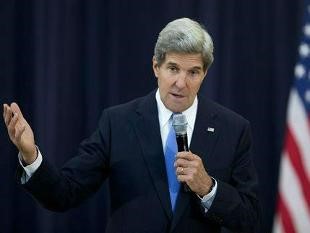 US Secretary of State John Kerry’s visit to India beginning Sunday is his first since he assumed his current post from Hillary Clinton in February this year. Intended to re-energize the bilateral relationship, Kerry will co-chair the fourth bilateral strategic dialogue with India’s External Affairs Minister Salman Khurshid on Monday. It is also Khurshid’s first interaction with the US Secretary of State and is the first high political interaction in the second term of the Obama Presidency.
US Secretary of State John Kerry’s visit to India beginning Sunday is his first since he assumed his current post from Hillary Clinton in February this year. Intended to re-energize the bilateral relationship, Kerry will co-chair the fourth bilateral strategic dialogue with India’s External Affairs Minister Salman Khurshid on Monday. It is also Khurshid’s first interaction with the US Secretary of State and is the first high political interaction in the second term of the Obama Presidency.
Kerry is leading an interagency delegation to the Strategic Dialogue that comprises the newly-confirmed Secretary of Energy Dr Ernest Moniz, Admiral Locklear of the Pacific Command, the Acting Department of Homeland Security Deputy Secretary Rand Beers, President Obama’s science advisor Holdren, the USAID Director and the Administrator of NASA among others.
The Strategic Dialogue is the premier mechanism in the wide-ranging dialogue architecture between India and the US. Khurshid and Kerry will take the opportunity for stocktaking of the current state of the relationship, and will aim to outline a vision to re-energize the way ahead.
The detailed Khurshid – Kerry conversations most of Monday will focus on four broad thematic pillars. One would cover the bilateral economic and security aspects of the relationship, including energy. Bilateral trade has now passed the $100 billion mark and bilateral levels of investment are rising. Areas of concern to business, like visas and market access and, for the US, intellectual property protection, local content restrictions, continued restrictions on foreign direct investment and taxation reform, will be discussed. There will be a conversation about clean energy and climate change. Under the Partnership to Advance Clean Energy, about $2 billion in finance for various kinds of clean energies, primarily solar, has been mobilized.
The next conversation would be detailed political consultations on regional and global issues, which would focus on Afghanistan. New Delhi will seek details of just what Washington wants to discuss with the Taliban, while reiterating the ‘red lines’ and its own support for the sovereignty of the Afghan government. The third major pillar would be global issues, with consultations on developments relating to multilateral and other fora including in the evolution of a regional architecture in Asia.
The Secretary of State will also be meeting Prime Minister on Monday the 24th.
Cyber security forms an important part of the bilateral dialogue. It is part of the Homeland Security Dialogue plus interaction between the Indian National Security Council and the American DHS, a process that was set up after President Obama’s visit to India in 2010. There are six Working Groups within this security dialogue.
One deals with the global supply chain, which comprises all issues relating to trade and commerce, secure movement of goods and people through ports, seaports and airports, and ensuring the security and integrity of the movement of goods and people. The second Working Group deals with illicit finance and counterfeit currency; the third Working Group deals with technology, essentially securing technologies for homeland security which are used by US law enforcement authorities.
The fourth Group deals with cyber security which deals with the operational aspects of conversation on securing critical infrastructure and preventing hacking. The fifth Working Group deals with capacity building and opportunities for law enforcement authorities to obtain training opportunities with premier law enforcement authorities in the US. The sixth is the Working Group that deals with Megacity Policing.
The higher education dialogue will happen on Tuesday the 25th, co-chaired by Kerry and the India Minister for Human Resource Development Pallam Raju. There are two parts to this dialogue; one part is what the US calls community colleges and what India calls technical education. The HRD Ministry will roll almost 200 new community colleges in the next few months, using existing facilities, with the US as a partner. Also being looked at is higher education in premier colleges of India and cooperation with the United States’ colleges. There were a number of regulatory issues that the US was looking at in terms of policy.
Online learning is another key area being considered for cooperation. India is very keen on the capacity to use the internet greatly to reach out to a number of young people who are otherwise left out of capacity to reach higher education.
No stranger to India, Kerry has visited India before as a Senator and as Chair of the United States Senate Foreign Relations Committee and was a major backer of the Indo-US civil nuclear agreement. He first visited India more than 20 years ago, leading the first U.S. congressional trade delegation. He also has long supported permanent Indian membership in a reformed UN Security Council.
Nilova Roy Chaudhury is Editor-in-Chief of the Indian Review of Global Affairs